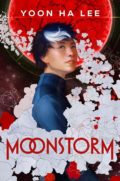short stories
“The Starship and the Temple Cat”
Properly, the cat’s name was Seventy-Eighth Temple Cat of the High Bells, along with a number of ceremonial titles that needn’t concern us. But the people who had called her that no longer lived in the station’s ruins. Every day as she made her rounds in what had been the boundaries of the temple, she saw and smelled the artifacts they had left behind, from bloodstains to scorch marks, from decaying books to singed spacesuits, and yowled her grief.
“Welcome to Triumph Band”
Congratulations on your acceptance to the Triumph Band Program. Successful completion will prepare you for an exciting career in the Navy’s marching bands, including performances at our Great Nation’s capital. Cadets who are unable to meet minimum musicianship standards will be assigned remedial work and stationed at the Wall to provide entertainment for our loyal troops there.
Extracurricular Activities
When Shuos Jedao walked into his temporary quarters on Station Muru 5 and spotted the box, he assumed someone was attempting to assassinate him. It had happened before. Considering his first career, there was even a certain justice to it.
The Chameleon’s Gloves
Rhehan hated museums, but their partner Liyeusse had done unmentionable things to the ship’s stardrive the last time the two of them had fled the authorities, and the repairs had drained their savings. Which was why Rhehan was on a station too close to the more civilized regions of the dustways, flirting with a jeweled woman and feigning interest in pre-Devolutionist art.
In spite of themselves, Rhehan was impressed by colonists who had carved pictures into the soles of worn-out space boots: so useless that it had to be art, not that they planned to say that to the woman.
Falcon-and-Sparrows
As I grew in years, I had participated in the new capital’s migrations—what we called the glider contests. My mother, bemused, had given me her encouragement.
Even today I don’t know what had led East Kheneira’s Cultural Preservation Council to choose the migrations as a designated cultural treasure. But the contests were held every year, not just in the capital but in a number of towns. Glider artists from Falcons Crossing dominated the contests. I was not the only one to study their methods, desperate for some hint as to their mastery. It was unlikely to be in their designs, which were conventional. They used the paper provided for the contests, so that couldn’t be it either. Perhaps, as some said, it was their devotion to the art, which had a longer lineage in Falcons Crossing than elsewhere.
I had come to the town itself in hopes of finding the answer. What I expected to discover, I don’t know. But anything was better than lingering over my mother’s possessions, trying to puzzle out the mysteries that had led to her dying with no one to mourn her but a half-Kheneiran, half-Ulowen child.
Shadow’s Weave
When Tamalat heard the crunching in the snow behind her, she knew who had followed her to the funerary tower. So close, she thought, but there was no help for it. “I thought an ex-engineer would be better at following directions,” she said, turning around. She knew better than to leave her back exposed.
Foxfire, Foxfire
No; I wandered the Lantern District in search of a soldier. Soldiers were easy enough to find, but I wanted a nice strapping specimen. At the moment I was posing as a prostitute, the only part of this whole affair my mother would have approved of. Certain human professions were better-suited to foxes than others, she had liked to say. My mother had always been an old-fashioned fox.
“Baekdo,” she had said when I was young, “why can’t you be satisfied with chickens and mice? You think you’ll be able to stop with sweet bean cakes, but the next thing you know, it will be shrimp crackers and chocolate-dipped biscuits, and after that you’ll take off your beautiful fur to walk around in things with buttons and pockets and rubber soles. And then one of the humans will fall in love with you and discover your secret, and you’ll end up like your Great-Aunt Seonghwa, as a bunch of oracle bones in some shaman’s purse.”
The Cold Inequalities
The archiveship’s master index showed no change. It was Anzhmir’s duty to monitor the jewel-flicker of her freight of quantum blossoms in their dreaming, as well as the more mundane systems that regulated navigation, temperature, the minutiae of maintenance. The archiveship’s garden consisted of a compressed and sequenced cross-selection of human minds, everything from pastry chefs to physicists to plumbers. The selection was designed to accommodate any reasonable situation the colony-seed might find itself in, and a great many unreasonable ones as well.
Anzhmir had reached for the book’s address in memory, and found instead a wholly unfamiliar piece of lore. The discrepancy could only mean one thing: a stowaway.
